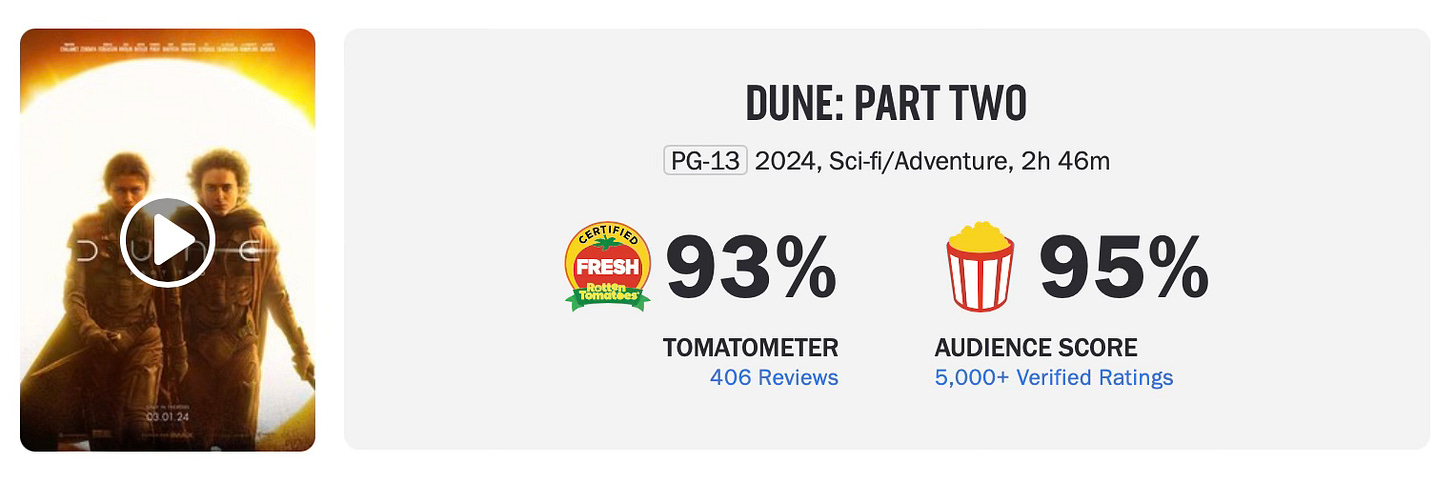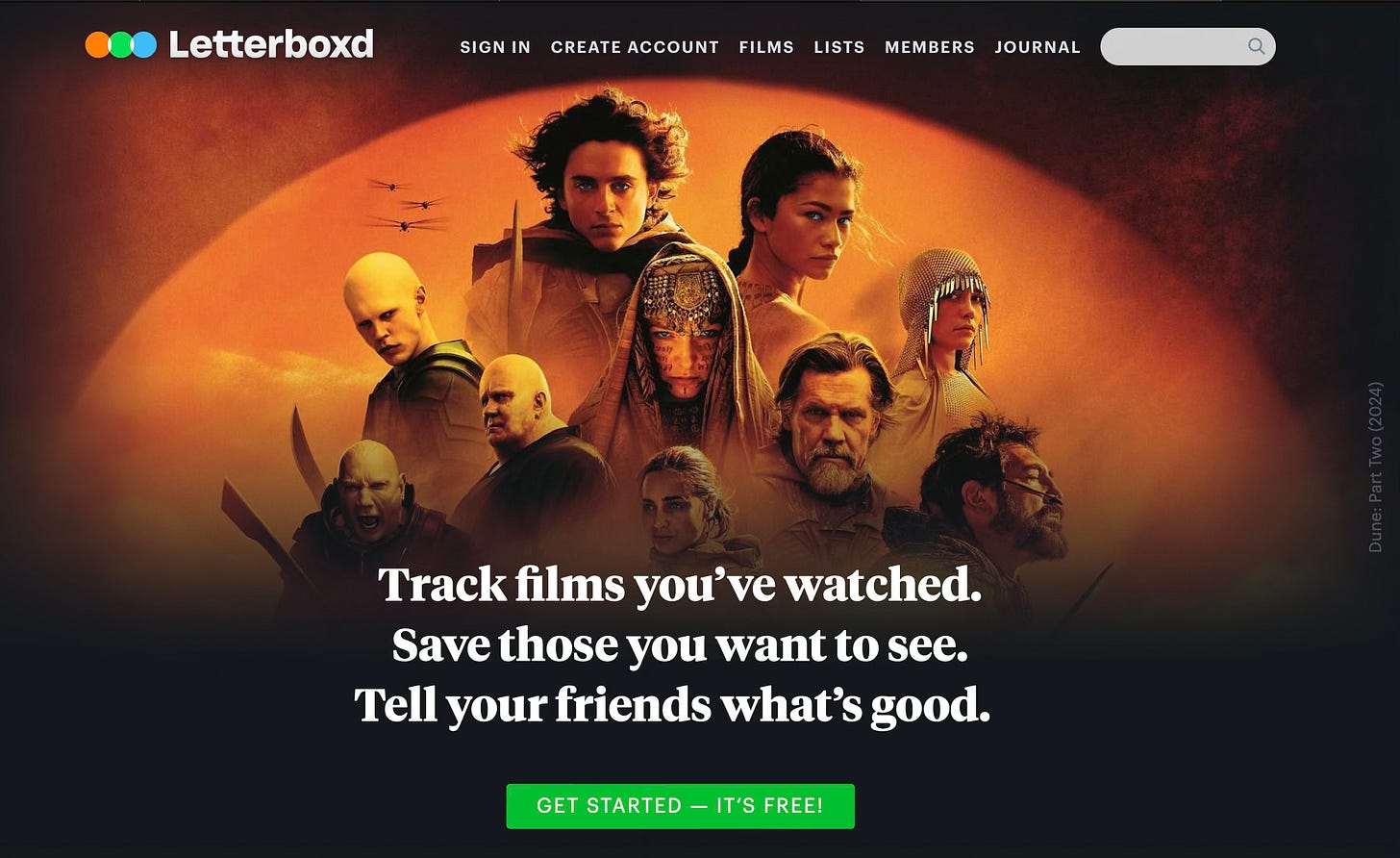Something Is Rotten With The Tomatoes
The notorious rating aggregator has let itself get gamed by studios and flooded with too many reviewers. It's time to ditch the noise of the site and listen to individual critics again.
In the beginning, Rotten Tomatoes wasn't a half-bad idea. Back in the late 90s, a 26-year-old Senh Duong wanted to create a central location for Jackie Chan movie reviews. Launched in August 1998, the site quickly gained traction.
If Rotten Tomatoes remained a website that had a collection of film reviews, that would have been fine. The problem is that they started aggregating those reviews to create the infamous “fresh” or “rotten” score. At the same time the number of critics on Rotten Tomatoes increased.
A wide release film like Dune: Part Two currently has 404 reviews aggregated to a 93% “fresh” rating.
Why do I think this is a problem? Imagine walking into a room with 404 people and they could only tell you about a movie by holding up a green or red card. With that many people it’s easy for interesting analysis of a film to get lost in the crowd. Or say that out of the 404 people 100 truly loved the film and their explanation as to why might help you determine if you’d like it as well. How is aggregating 404 reviews into a number helpful? What understanding about any film do you actually gain from it?
While the internet has provided opportunities for new voices and perspectives, it's also led to a devaluation of expertise. Traditionally, film critics needed to be employed by established publications, demonstrating a base understanding of filmmaking. Today, anyone can launch a review site. Building an audience can be done organically through quality content, but let’s be honest, it can also be done by some manipulating SEO tactics and/or paying for bot armies in order to inflate page views and meet the Rotten Tomatoes threshold. 1
The Rotten Tomatoes system reduces the value of interesting and thoughtful critical analysis by lumping it in with less informed reviews, all in order to assign a single trademarked "fresh" or "rotten" score.2
Letting anybody that meets a minimum threshold onto Rotten Tomatoes combined with the realization that box office performance became tied to a Rotten Tomatoes score, unsurprisingly led to the system being gamed.
Back in September of 2023 Vulture reported the following:
But just because the “Tomatometer” says a title is “rotten” — scoring below 60 percent — it doesn’t need to stay that way. Bunker 15 went to work. While most film-PR companies aim to get the attention of critics from top publications, Bunker 15 takes a more bottom-up approach, recruiting obscure, often self-published critics who are nevertheless part of the pool tracked by Rotten Tomatoes. In another break from standard practice, several critics say, Bunker 15 pays them $50 or more for each review. (These payments are not typically disclosed, and Rotten Tomatoes says it prohibits “reviewing based on a financial incentive.”)
Once that “fresh” score became a prize to be won by a major studio spending tens, if not hundreds, of million of dollars on a film, this was all about inevitable.
Now as a filmmaker I can’t really blame somebody that has read this far and is wondering if I just have a natural predisposition to not like film critics. Fair enough, but that’s not the case. As somebody that loves film I’m very much a fan of reading the perspective of other people that appreciate the art form.
Now it has been said that a problem without a solution is not a problem. So here is my solution - find a critic, or a few critics, that you like and engage with their work. I’m not saying that you should find a critic that you agree with, but you should find a critic that has the same sensibilities as you do.
Make a list of your favorite films from the last few years. Now, read what critics are saying about them. Look beyond whether you agree with their review and focus on understanding their reasoning. Does their critique make logical sense, even if you disagree? Do you respect their perspective and their knowledge of film? Do they mention cultural touchstones that resonate with your own experience? Finally, do you enjoy their writing, or given that it is 2024, what they are saying on a podcast?
How do you find critics? Well, go back to what Rotten Tomatoes was at the beginning - a collection of reviews. Look up a movie and scan the blurbs from the “top critics” and if one jumps out at you read the full review.
Or, I’ll point you in the direction of Sonny Bunch, the Culture Editor for The Bulwark. I dig Sonny’s criticism because like me he is a) a first wave millennial (so we share a few cultural touch points) b) is a Nolan fan, and c) is a fan of Zack Snyder. I don’t always land in the same place as him on certain movies but I appreciate how he arrives to his conclusion. Plus, he is the only person today that reminds me of the late great Roger Ebert. Ebert could write about a film as both an academic and audience member at the same time. Sonny does the same.
Oddly enough, the life of Rotten Tomatoes can be charted onto the evolution of the internet. The original intention was noble: to connect people with other people, specifically film critics. However, the rise of algorithms, the pursuit of online influence by some reviewers, and the financial incentives tied to a "fresh" score all overshadowed this original aim. Stepping away from the homogenization of Rotten Tomatoes and focusing on reading a few well-respected critics is a good path forward.
Something to Watch:
Sometimes when I need some background noise, I open YouTube and listen to old episodes of Siskel and Ebert. Part of it is nostalgia, for sure – their show was a staple of my childhood. But a bigger part is the respect I have for their deep understanding of film.
Also, I finally got around to watching Anyone But You. The rom-com elements were perfectly executed, Sydney Sweeney and Glen Powell are solid, and the supporting cast added a lot of charm. It’s not reinventing the wheel or anything, but it was a very pleasant ride.
Something to Hear:
Since I mentioned Sonny Bunch let me also point you in the direction of the podcast he hosts, Across The Movie Aisle, along with Alyssa Rosenberg and Peter Suderman.
Here’s the blurb:
“Here’s the elevator pitch: It’s “Left, Right, and Center” meets “Siskel and Ebert.” Three friends from different ideological perspectives discuss the movies and controversies (or nontroversies!) swirling around them.”
Something Extra:
If you are a movie fan I highly recommend using Letterboxd. It’s fun to keep track of the movies you watched and see which ones your friends are watching (and what they thought of them). Plus, you can create a watchlist of movies you want to see and find out where they are playing. Remember when social media was just social networking, the idea of sharing between people you know? Letterboxd has recreated that for movies
Check it out here: Letterboxd
Note: The image for this post was created with Adobe Firefly. Adobe paid the contributors that provided the stock images used to train this AI model.
Admittedly, I’m being flippant here but I linked to the Rotten Tomatoes eligibility page because I’m a straight shooter.
Yes, I realize I’m talking about gatekeeping and what I’m suggesting is that sometimes it is fine.




